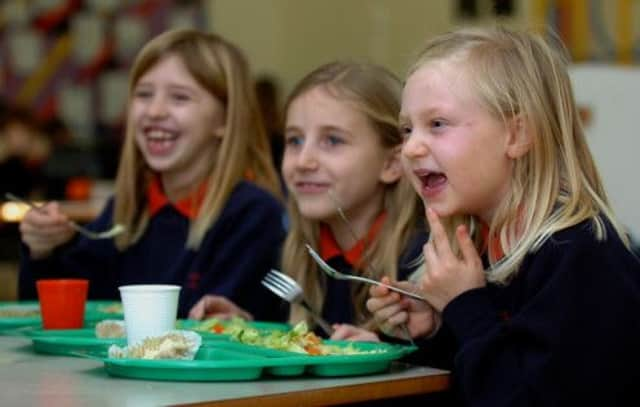SNP’s school meals pledge faces £25m shortfall


Scotland’s local authorities have warned that the policy will cost far more than the £64m earmarked for it from public funding.
Council leaders claim that other services will have to be cut in order to plug the funding gap if plans to feed 165,000 youngsters in their first three years at school are to be delivered in time.
Advertisement
Hide AdAdvertisement
Hide AdEarlier this year, the First Minister announced that all school children in primaries one, two and three would get free lunches from January next year.
Salmond said the policy would boost health and was worth £330 a year to families. The move would replicate an English proposal to give free school meals to children up to the age of seven.
But yesterday David O’Neill, president of the Convention of Scottish Local Authorities (Cosla), said councils were questioning how the proposal would be funded.
“Our main concern is that this policy has been imposed on us,” O’Neill said. “Local authorities have been asked to carry it out, but we are not sure if the resources or the infrastructure are there.
“This policy was based on a pilot carried out by Highland Council, which had a 75 per cent take-up. I think the take-up will be much higher elsewhere. So there will probably be a fairly substantial shortfall.”
It has been estimated that the true cost of the project will come to £88m – far in excess of the £64m provided through public funding.
O’Neill said: “We will work to deliver the policy, but if it turns out that the expectation is for local authorities to use some of our resources, the reality is that we will have to stop funding something else and services will suffer.”
His attack marks another low point in a deteriorating relationship between Scotland’s local authorities and the Scottish Government.
Advertisement
Hide AdAdvertisement
Hide AdLabour-run councils are growing increasingly frustrated over what they see as the Scottish Government bypassing them when they make policy decisions.
O’Neill said that a more productive approach could have been taken by the Scottish Government if ministers had consulted with council leaders before implementing the policy.
“If the government had sat down with us and talked about it, we could have worked out a better way of doing it,” he said.
Labour’s education spokeswoman Kezia Dugdale said: “The Scottish Government should heed the warnings from Cosla. Councils need clarification and urgent reassurance that this commitment will be properly funded with new money.
“They have faced the brunt of SNP cuts to date. They can’t be expected to do more and more with less and less.
“The Scottish Government doesn’t know how this policy will be delivered. We know it is causing significant challenges in England. The Scottish Government can’t let that happen here.”
At the end of last year, it was reported that the coalition is having to raid its school capital budget to find cash to build new school kitchens and fulfil its pledge to let all primary schoolchildren aged five to seven receive a free school meal.
The school meals pledge was announced by Nick Clegg, the Deputy Prime Minister, at his party conference last September.
Advertisement
Hide AdAdvertisement
Hide AdA Scottish Government spokesman said: “The Scottish Government is fully funding its commitment to ensuring that all children in primary 1 to 3 will have the option of a free school meal from January 2015.
“In order to deliver our commitment on free school meals, we have been working closely with Cosla and will continue to do so over the next year to explore how any practical implications can be addressed, building on the experience of the free school meal trial which ran over 2007-8.”